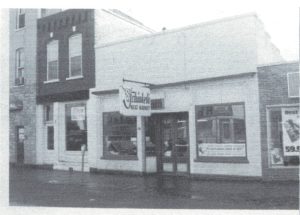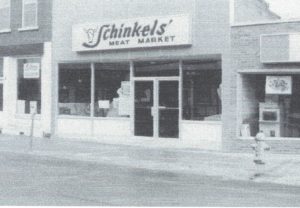Schinkel’s Meat
Market History

“The early years were a lot of fun,” says Gerry. Business was booming from the start. “Every week had better sales than the previous week for a long time.” This continued growth was mostly credited to the renovations that were done when they first opened. Although the business was growing, it was a few years before the brothers realized a profit, mostly due to the renovation costs.
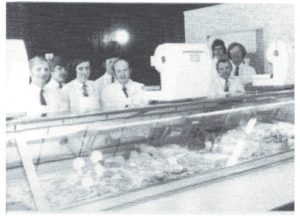
Gerry and Ruth built a new house in the first year. When Gerry and Ruth were approved for a mortgage, the store’s accountant made the observation, referring to the bank, “Those dummies don’t know how to read a financial statement.”
Gerry was proud of the hustle and bustle of the business. “On Fridays, the streets were busy and the store was packed with people who would patiently stand and talk. It was a meeting place. It was really cozy. When the Legion sold poppies, they would have someone in front of our store because we were one of the big stores in town then,” recalls Gerry. This was before the time of the big supermarkets.
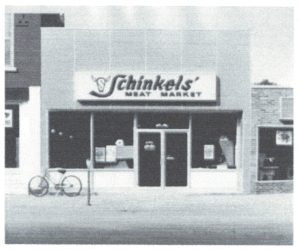
After being open for about 5 years, the Schinkel Brothers did some more renovations. They replaced the old refrigerated display counters that had come with the store. The layout of the store also changed to allow for more room for the customers. Instead of having the display counters run across the store, they were placed lengthwise. Gerry was impressed with the new counters. “They made the store look classier.
In 1975, a chance to expand the store arose, and the Schinkel brothers would not let the opportunity slip by. The barber shop, located next door, was for sale. Although the barber shop itself was quite small, it would work great to expand the front of the store and allow for more space and products. The plan was to rip out the adjoining wall so the shopping area would be expanded. But when construction time came, it was discovered that the joists were cracked and the foundation was rotting and needed to be rebuilt. The entire building next door was torn down and reconstructed. Gerry recalls that at this time, “The old lady in the apartment upstairs still drove a Model T.”
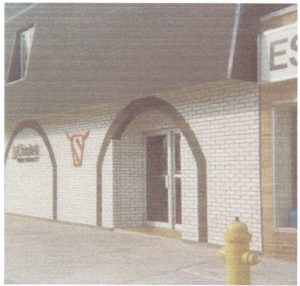
At this time the exterior front of the store was also given a face lift. The white brick with arches in front were quite attractive and helped draw in more customers. It was voted the most architecturally attractive building in Essex. This was very impressive, considering the new county building had also been recently opened. “It was these years until the Explosion that were our best years,”explains Gerry.
In 1976, Gerry and Herman showed their Dutch heritage by expanding their product line to include imported Dutch groceries and cheese.Mrs. Bol was retiring from the business she and her late husband had run for many years. Mr. and Mrs. Bol had operated their Dutch import business for many years from the basement of their home on Laird Street in Essex. Many of the older Dutch immigrants from this area have often reminisced about Mr. Bol going house to house to deliver his groceries and candies. In their basement were some shelves to display the groceries and keep them off the damp floor and the lighting was insufficient. Mrs. Bol had a young high-school student, Mary Ann Verkinderen, working for her on the weekends and after school. Mary Ann would use an old slicer to slice the Dutch lunch-meats and cheeses and weigh them on an old scale, and she also helped to stock the shelves.
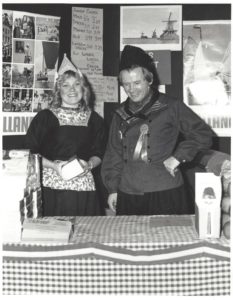
Gerry and Herman did not officially purchase the business from Mrs. Bol. They purchased all her inventory at cost and then bought her old slicer for $500. This was too much money for the slicer, but it was their way of buying the business. Gerry bought some new shelves for in the store and there was some concern that they would not be able to fit all the new groceries into the store. But Gerry was not concerned. He took the groceries and filled the new shelves up. This grocery line was an instant success. The special treats and groceries were something the many Dutch immigrants in the area could not find elsewhere. This brought new customers into the store. The Dutch like their cheese, and the cheese sales began to soar. Mary Ann soon had her old job back, but with Gerry and Herman instead of Mrs. Bol. It was not long before the salesmen from the importers were calling Mary Ann as she was quickly placed in charge of purchases and stocking the Dutch inventories. Mary Ann (now Reaume) recalls that she started working on Nov. 11, 1976 as a weekend job. Thirty years later, she is still a vital employee of Schinkels’ Meat Market.
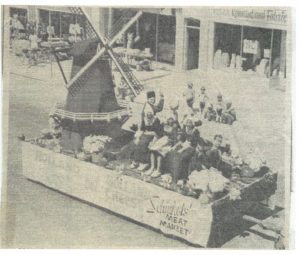
A mailing list of the Dutch customers has been compiled over the years for the purpose of sending sale flyers. There are now hundreds of names on that list. People have come from all over Windsor, Amhurstburg, Kingsville, Detroit, and even as far as Ohio. Many of these people would never have come to Essex if not for the Dutch products. Not only were these customers new to Schinkels’ meat Market, but new customers to Essex.
C.W. Roberts opened his butcher shop in 1912, a few years after the first devastating Essex explosion in 1908. In the early morning hours of Valentine’s Day, 1980, an event happened that would be permanently etched into the memories of the Schinkel families and the people of Essex. Across the street, behind the Home Hardware store, a car drove into a natural gas main. The gas drained into the hardware store and when the furnace kicked in, BOOM!!! A tremendous fire broke out and it took six fire departments all night to contain it. The businesses across the street were reduced to rubble.
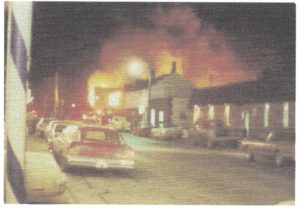
When Gerry arrived at the store early that morning, the Essex fire department was busy trying to contain the blaze and waiting for their backup to arrive. Gerry came to the rear of the store and decided that it did not look too bad. But the rear door could not be opened because the door frame had shifted and jammed the door shut. Gerry recalls seeing the rear door of the pool hall next door was blown open. “I went through the pool hall. Some of the joists had fallen down and I had to crawl under some of the pool tables to get to the front door. When I got in my store, I saw it was a mess. Ceiling tiles down, all the glass was broken, groceries blown off the shelves. The sides of beef hanging in the cooler were knocked off the rails to the floor. There was no electricity and it was difficult to see. The phone was off the hook. I put it back on the cradle , checked for a dial tone, and called Herman.” Herman, living in Cottam, had been awakened by the explosion. He had originally thought the furnace at his parent’s home next door had blown up. After checking with them, and seeing all was well, he went back to bed. Gerry’s call had him in Essex shortly.
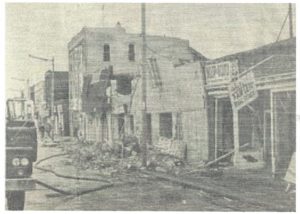
In the dark, Gerry and Herman thought that if they worked hard to clean up, they could be open for business the next day. But the damage was much worse than they first anticipated. Walls were moved off their foundations and joists were cracked. The building was condemned. It was important to the Schinkel brothers that they re-open as soon as possible. The sooner the mess was cleaned up, the sooner the rebuild could begin, so they had the entire staff in the store, cleaning up the mess. Chief Primeau stopped by and took Gerry for a ride and explained that people could not be working in a condemned building. Years later at the citizen of the year award dinner for Chief Primeau, Gerry was quoted as saying what a classy guy the chief was. “I was “picked up” by the police and did not even know it.”
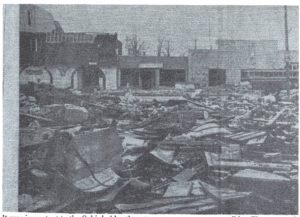
Gerry was the reeve of Essex at the time and there was real concern that this would be a devastating blow for the town and that the town would not recover from this. But the merchants pulled together and the rebuilding process was started quickly. Gerry and Herman were anxious to reopen as quickly as possible. They were concerned that their customers would begin to shop elsewhere and not return. Schinkels’ Meat Market only took 110 days to tear down the old building, rebuild, install new equipment, reorganize and reopen. It was the second business to reopen after the explosion.
June 3, Gerry and Ruth’s anniversary, was the reopening date. Gerry couldn’t believe at first how customers just started to come back. “I recognized the customers coming in at the same time and day as they always did, and they didn’t say anything about the new store, they just started shopping.” Although the customers started to come back, it took a few years to return to the same sales levels of before the explosion. With the new Gordon’s (now Zehrs) store opening during the rebuilding period, the shopping habits in Essex were changing
A new Schinkel legacy was about to be born. After the explosion, Herman wanted to try making his own luncheon meats. Herman had vacationed in Europe and visited many of the little butcher shops in his native Holland and in Germany. Many of them made their own smoked sausage and luncheon meats. Herman spent a lot of time reading books on making sausage and luncheon meat, and decided that it was a great way to distinguish Schinkels’ from the larger chain stores. So Herman began making his own bacon, smoked sausage and lunch meats. First he started with bologna. It was made without any milk ingrediants or MSG, as there were an increasing number of people with allergies. The bologna worked so well, he started to smoke some sausages and bacon. For a smoke house, he used an old refrigerator that was just out the back door.
Gerry did not seem interested in this new venture. He thought that the little bit of dabbling Herman was doing was a waste of time. What Gerry disliked the most was that old refrigerator sitting out the back door. “It looked junky,” says Gerry, “I wanted to get rid of it.” Since Gerry was the reeve at the time, he was often in the town office. He asked the person in charge of waste collection if they would pick up an old fridge. “We’ll take care of it for you,” he was told. Gerry did not want to hurt Herman’s feelings, but he wanted “that old piece of crap” gone in the worst way. When Gerry came to work one morning, Herman was quite upset. “Who took my smokehouse?” Gerry, quite innocently, said, “I bet the garbage collectors saw that old piece of junk and took it away.”
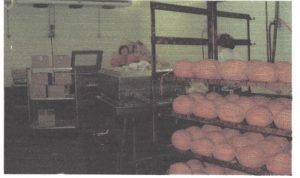
Hams coming out of the smokehouse
Herman was disappointed, but not deterred. “I have another old frige in my garage.” Gerry had to think fast or there would be yet another eye-sore sitting out the back door. “Herman,” he said, “if you want to get into smoking meat, why don’t you forget about mucking around and get a real smoke house?”
Did Gerry think it would really happen? Was it worth thousands of dollars for a new smokehouse, just to avoid having a fridge sitting behind the store? Will Herman be upset at his brother’s scheming when he reads this, almost 20 years later?
The Schinkel name and reputation would grow with this new purchase. Herman was now making more product and soon his son Richard was hired full-time to keep the smokehouse running. More processing equipement was purchased to make other lunch-meats and sausages.
In 1983, the Schinkel brothers opened a second store in Chatham. The new building in Chatham was constructed and laid out in a similar manner to the original store in Essex. Gerry remained in Essex, and Herman moved to Chatham to run the new location. After a year, Gerry and Herman split their partnership and ran their businesses independently. It was not long before the Chatham location was also a big success.
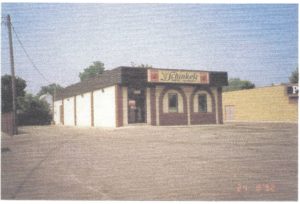
Richard stayed in Essex and continued to make lunch-meats and sausages and many of the items were shipped to the Chatham store. But Herman started to make his own products and soon the lunch-meats and sausages were being shipped to Essex. It was becoming more feasible to make all the products in the Chatham store, which had a full basement and much more room to process all the new products. In 1988 Herman’s son, Tim started working in the basement full time, processing the lunch-meats and sausage. Soon his brother, Richard, moved from Essex to Chatham to work with Tim.
In 1991, Herman and his wife Tena once again vacationed in Holland. This time they brought with them three of their products to the renowned Slavacto International Butchers competition in Utrecht, Holland. The competition is held every three years. There were 1200 entrants representing 14 different countries. More than 45,000 people attended the competition. Herman and Tena struck gold. Not just gold, but gold, gold and silver awards, one for each of the products they brought with them. The media recognition Herman received upon returning home was tremendous and propelled sales to a new level. Tim and Richard could not keep up with demand, and they were running out of room in the basement of the Chatham store. Another new Schinkel enterprise was born.
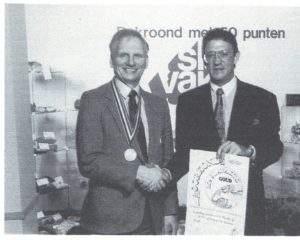
Tim opened Schinkels’ Sausage and Deli Products, a processing facility in Chatham in 1992. Tim’s business was not a retail store, but a wholesale business. His business could not survive selling only to the two stores owned by his father and uncle, but he needed to sell his products to other businesses as well. The Schinkel name therefore started to appear all over Essex and Kent County in other small butcher shops and delis. Tim recalled that it was a real struggle the first few years. He remembers thinking, “You don’t know how much temptation there is to sacrifice quality to get better numbers.” But Tim stuck with the family tradition of quality and the Schinkel name and products were recognized and his new business eventually became quite successful. Tim went on to win more and more awards for his products, and his product list and customer lists keep growing. His has needed to expand his processing and manufacturing plant several times before the millennium.
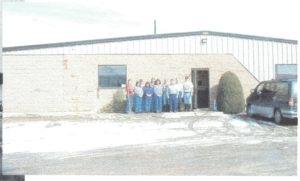
Gerry has always taken great pride in his family. His is very proud of the time when Jacqueline, Terry, and Greg all worked together with himself and Ruth in the store. Although it did not last for very long, Gerry was happy that his whole family could get along well in a working atmosphere.
Gerry began to look to the future. Who would run the business when he retired? Of course, he would like to see the name carry on for more generations, and he looked to his oldest son, Terry. Terry expressed interest, but said that he would like to have lots of time off to do other things. Terry worked part time in the store and knew how much time his father invested into the business. Terry was often busy with sports and friends and, although he enjoyed working in the meat market, he did not want to be tied down to it as a full-time career. Gerry noticed his son’s reluctance and told him,” If you’re not willing to put in the time, then you can’t own a business.” Terry moved on to a career in computers. Jacqueline decided that raising a family was enough of a full-time occupation.
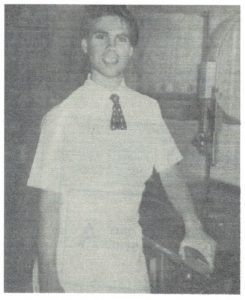
Gerry had one last chance for the Schinkel name to live on. His youngest son, Greg started working in the family business at the young age of 14 in 1984. Gerry soon asked Greg about his interest in the business. Greg was interested, but Gerry insisted that he must graduate from college or university first. Gerry knew that businesses come and go, and Greg must have something to fall back on if the business did not work. Greg complied with his father’s requirement and graduated from St. Clair College in 1992 and began to work full time. Soon he began to buy shares from his dad and mom and became a third partner. By 1997 he had bought all the shares and became full owner. “Now Mom and Dad work for me.”
Gerry thought it was fitting that his son took over the business when he was 27 years old, the same age Gerry was when he and Herman bought the business from the Roberts brothers. Gerry and Ruth began easing into retirement, working fewer hours, and taking more vacations, but were and are still there to help out and offer support (and advice) when needed.
One of Greg’s first major actions as owner was to completely renovate the store. An interior decorator was hired and the change was very dramatic. It was a much brighter store with new lighting and walls. More meat counters and freezers were added. He expanded the existing product lines to include some ready-made meals and more frozen foods. Most of the grocery shelves were removed and more self serve meat and cheese counters were installed. This renovation not only created more space for the customers, it gave a much more spacious look and feel to the store. This was also a great change in the direction of the business. It was decided that many of the grocery items that could be purchased at the supermarkets and discount stores would be discontinued. The grocery items that were kept were the imported (Dutch) specialty goods and the more upscale specialty items that would not be found in other stores. This proved to be a good move, reinforcing the image of a special store with quality products. Customers were very impressed with the changes and many compliments were received.
When businesses hit milestone anniversaries, people often ask,”To what do you attribute your success?” That is not always an easy question to answer, but one thing I can say for sure is that there is not one single item I can credit to the success of our family business.
There are many little accomplishments we have been proud of over the last 40 years. Some would say that being in business for that long is a great accomplishment in itself, but I would say that just surviving 40 years is not much of an achievement. Through all the years, I have lived in a nice home, had nice clothes on my back, and have been provided for quite nicely. Mom and Dad didn’t have a summer house in Florida or a cottage up north, nor will they retire wealthy, but I don’t think that was the goal they had in mind when they started out in 1962. They wanted a job that they enjoyed and the ability to provide for their family. Not only have the Schinkel families been provided for, but many other families as well. This is success.
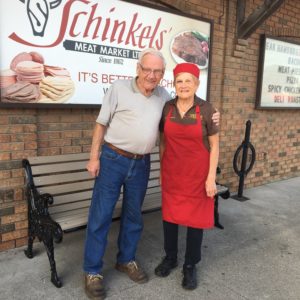
Many of the staff earned their way through college and university while working in our store, and many have come back and told us how much they loved working in our store. Our staff turnover rate has always been low and I feel that reflects on how we have treated them as employees and people. This is success.
My father was elected to town council a number of times and twice as major. The reputation he earned as a businessman helped him to get elected. As well, his time in politics helped the Schinkel name be even more recognized. This is success.
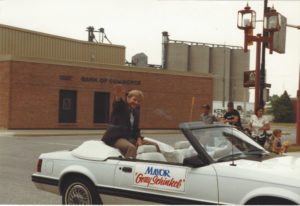
We see our regular customers often enough that we remember many of their names. This is an incredible task, but we keep trying. Many of our customers take the time to come to our store from all over Windsor and Essex County. Many have moved away from the area and when they are back visiting, take the time to come and buy our products and bring it home with them to Toronto, Kitchener, Grand Bend, Ottawa, etc. This is success.
Many people trust us to be honest and fair. A number of wholesale accounts do not check the weights of products we ship because the Schinkel name is trusted. This is success.
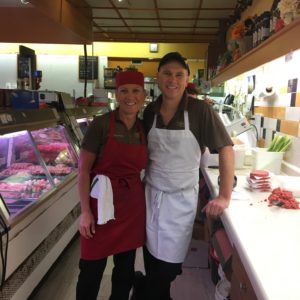
My parents brought me to church, told me about Jesus, taught me to read my Bible and live by its teachings. I believe that when God said we “should not work on the Sabbath day, neither us nor our manservants or maidservants”, that it is also applied to today. Even though I could earn more money by being open on Sunday, I will not sacrifice my faith. This is success.
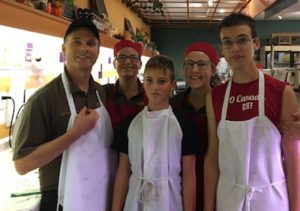
Success can be measured in different ways. Some like to measure success by the house you live in and the car you drive, but these are not the true measures of success. I am very proud of my father and mother’s accomplishments and the opportunities they have provided for me. I am very proud of the staff we have had over the years and the dedication they have shown. I am very proud of the products we provide our customers and proud of the community in which we serve. These intangible items I have listed are the true measure of success.
I wish to thank the many customers we have had over the years for our family’s successes. For success in business is really measured by the customers that patron that business. I hope to make you proud to have a business like ours in our community.
Thank you all for your continued support.
Greg Schinkel

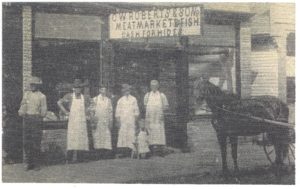
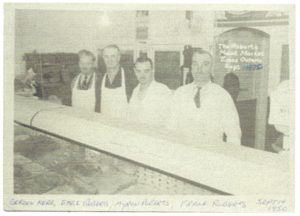 1950 – Gordon Kerr, Earl Roberts, Tiny (Myron) Roberts, Frank Roberts
1950 – Gordon Kerr, Earl Roberts, Tiny (Myron) Roberts, Frank Roberts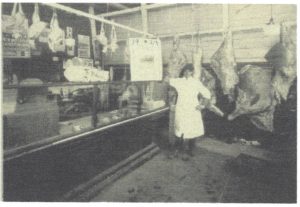 Frank Roberts in 1924
Frank Roberts in 1924